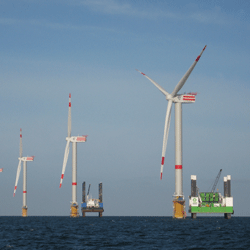 As Virginia awaits the issuance of a request for interest (RFI) from the Bureau of Ocean Energy Management, Regulation and Enforcement (BOEMRE), various entities within the state are busy collaborating on how to best lay the groundwork for the proliferation of offshore wind development.
As Virginia awaits the issuance of a request for interest (RFI) from the Bureau of Ocean Energy Management, Regulation and Enforcement (BOEMRE), various entities within the state are busy collaborating on how to best lay the groundwork for the proliferation of offshore wind development.
Maureen Matsen, deputy secretary of natural resources and senior adviser on energy to Gov. Bob McDonnell, R-Va., recently spoke with NAW about how Virginia is readying for offshore wind in advance of the RFI.
The RFI is the first step under U.S. Department of the Interior (DOI) Secretary Ken Salazar's ‘Smart from the Start’ offshore wind renewable energy initiative. It allows BOEMRE to identify priority areas for potential wind energy development and promotes an informed and responsible siting and permitting process for offshore wind projects.
‘Once the RFI is released, it begins the competitive leasing process,’ Matsen explains.
Developers responding to the RFI are required to include specific blocks of interest in the RFI area, project goals, a project timeline, available wind resource and environmental data for the relevant area, and proof that the developer is legally, technically and financially qualified.
To date, BOEMRE has issued RFIs for Massachusetts, Maryland, New Jersey and Delaware. So when does Virginia expect to receive its RFI? Well, that's anyone's guess.
‘I was expecting [the RFI] in January,’ Matsen notes, adding that state officials are working aggressively with the DOI to expedite the process. For example, McDonnell has twice met with Salazar to talk about offshore wind, which is emphasizing the need to reduce the length of time associated with the permitting process, seen as a major impediment to development.
Meanwhile, various groups in the commonwealth, such as the Virginia Offshore Wind Development Authority (VOWDA), are leading Virginia's offshore wind efforts. VOWDA, Matsen explains, is talking with developers and the supply chain, attracting manufacturers with larger-scale projects and collecting data and recommending ways to expedite development.
As with other states, Virginia sees the proliferation of offshore wind off its coast as having dual benefits: helping economic development as well as the development of the resource.
A study conducted by the Virginia Department of Mines, Mineral and Energy examining Virginia's prospects for offshore wind found that ‘the greatest opportunity for reducing the cost of offshore wind energy in Virginia is to attract offshore wind turbine manufacturing to the state.’
The study concluded that existing plants in Hampton Road, Va., could be retrofitted to also manufacture turbine components. This area, which includes large, open staging areas on deepwater wharves and have unconstrained access to the open ocean, could involve a chain of first- and second-tier suppliers to be qualified throughout the state. Additionally, the study found that offshore wind manufacturing could leverage Virginia's existing shipbuilding industry capabilities to fabricate large steel components that go into the turbine, such as yaw bearings, gears, shafts and nacelle base plates.
Efforts related to turbine manufacturing are already under way. In February, Gamesa Technology Corp. and the shipbuilding operations of Northrop Grumman Corp. launched the Offshore Wind Technology Center in Chesapeake, Va., to jointly develop the next generation of offshore wind systems that will be deployed in the U.S. and around the world. Plans also call for the development of North America's first offshore wind turbines by late next year.
Virginia, the second-largest importer of electricity after California, naturally stands to benefit from local offshore wind generation.
‘Some of our importing of electricity is for economic benefit,’ Matsen says, noting that energy demand in Virginia will only increase. ‘We worry about demand going forward and keeping up with that demand. We don't want our ratepayers depending on the wholesale market, because those prices can be volatile.’
However, there are some notable challenges: some that affect the offshore wind industry – such as lowering the cost of energy – and others that affect Virginia in general.
‘There needs to be an increased focus with bringing the cost of power down,’ Matsen says, citing the recent efforts of the DOI and Department of Energy to devote $50.5 million for the study of offshore wind that includes examining lowering the cost of energy. ‘I think the industry really needs to be at $0.10/kWh to be competitive.’
One remaining question is how the RFI specifically deals with one of the biggest siting constraints facing offshore wind in Virginia, namely interference with Department of Defense (DoD) operations.
‘The DoD has been a great deal more sanguine about offshore wind than it has been with offshore drilling in general,’ Matsen explains. ‘I'm optimistic that once the military becomes more familiar with wind turbines, any issues can be resolved through technology advancements.’



